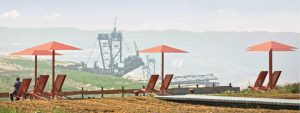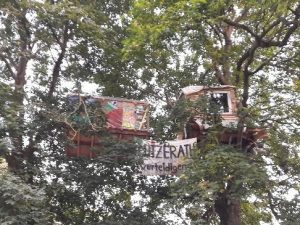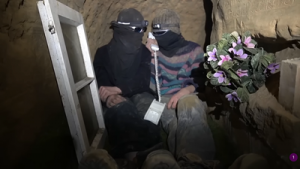cross-posted from the Atlanta Press Collective
Thursday morning a group of Cop City activists invoked a “people’s stop work order” and chained themselves to equipment at the construction site for the proposed Atlanta Safety Public Training Center, more commonly known as Cop City.
“This is a war happening against protesters,” Ayeola Omolara Kaplan, one of the five activists arrested, said via written statement. “If we don’t stand up for our right to protest now, standing up in the future will be vain. Cop City is in the process of being built, and this can only continue if we allow it.”

Left to right: Rev. David Dunn, Rev. Jeff Jones, Timothy Sullivan and Ayeola Omalara Kaplan.
Not pictured: Lalita Martin
Credit: The People’s Stop Work Order
Kaplan, a self-described Atlanta based revolutionary artist, was joined by Jeff Jones, a Unitarian Universalist volunteer community minister; Reverend David Dunn, a Unitarian Universalist Minister; Lalita Martin, an Atlanta resident; and Timmy Sullivan, a Georgia resident.
Before departing for the training center site, the five individuals carrying out the direct action were joined by a support group of around 25 other Stop Cop City activists. The group gathered in a circle, prayed, and sang a few refrains of “Ain’t Gonna Let Nobody Turn Me Around” to emotionally prepare for the day’s action. The five hopped into a white van and pulled out of the meeting site, followed by a caravan of supporters.
People put their bodies on the line, with the courage to stop this construction
Mary Hooks
When asked about the potential for life-altering felony charges for shutting down the construction site, Jaanaki Radhakrishnan, an organizer with the Student Coalition to Stop Cop City, expressed faith in her fellow activists and concern over the potential police response. “I trust that they have themselves together, that they know what they’re doing,” said Radhakrishnan as the caravan moved toward the construction site. “There’s always that you never know what the State is going to do, but they got it.”
What the State has done so far is throw the extreme charges against those arrested in relation to the Stop Cop City Movement.
Sixty-one individuals alleged to be part of the movement to Stop Cop City were charged in a sweeping Racketeering-Influenced and Corrupt Organizations (RICO) indictment on Sept. 5, and prosecutors have charged 42 activists under Georgia’s domestic terrorism statute since December 2022. The Georgia Attorney General’s office is prosecuting the RICO and domestic terrorism cases. In May, a joint APD and Georgia Bureau of Investigation (GBI) task force raided the home of three organizers with the Atlanta Solidarity Fund and charged them with charity fraud. Radhakrishnan believes that each of those events only served to undermine the State’s position in the eyes of the public.
“With each passing act of repression the State does, they’re making our case for us,” said Radhakrishnan.
Credit: Matt Scott
Judging by the dozens of individuals driving by – including one MARTA bus driver and several semi-truck drivers – who honked in support of a rally held outside the construction site the word about Cop City is out, and residents are against the facility.
Political theorist and Morehouse College faculty member Andrew J. Douglas took to X (formerly known as Twitter) to express similar sentiments and explain the groundswell of support for the Stop Cop City Movement. “These RICO charges will only build the movement,” Douglas wrote. “In the words of George Jackson, ‘Repression. Do you see the effect it has on the uncommitted? Comrade, repression exposes.’”
Since January, the construction site remained guarded nonstop by the Atlanta Police Department (APD), with typically 30 officers patrolling the grounds and surrounding roadways around the clock. The last time activists entered the site in March, police were chased out and construction equipment was destroyed. APD and other local police agencies responded with a massive police raid of a nearby anti-Cop City music festival that resulted in prosecutors charging 23 individuals with domestic terrorism.

Thursday morning, however, no APD officers stood guard at the Constitution Road. entrance to the construction site in unincorporated DeKalb. The five activists exited their van, entered the gate, and successfully chained themselves to a construction excavator for almost an hour. Construction remained shut down until the last activist was taken into custody around 10 a.m.
For their part APD officers did not engage with the support rally outside the construction site, choosing instead to fortify the gated entrance previously unguarded. One of the officers near the gate carried a gas mask and riot control rifle, and a second officer arrived a short time later carrying an assault rifle. The support rally organizers pre-arranged for an individual to be their police liaison and while police did speak to the liaison to request the group move several times, no arrests were made outside the construction site.

Credit: Matt Scott
“People put their bodies on the line, with the courage to stop this construction,” said Mary Hooks, national field secretary with the Movement for Black Lives told the media as the support rally ended.
When asked about the potential for domestic terrorism or RICO charges for the five activists who shut down construction Hooks said, “this is dignified and righteous protest. Anytime that somebody puts their bodies on the line for the cause…this was worth the risk.”
“Cancel this lease,” Hooks continued, listing the group’s demands. “Stop this right now. Take this $67 million, and let the people decide how it should be spent.”
Speakers at the support rally explained that the five individuals chose to carry out this direct action to draw increasing attention to the number of people supporting the Stop Cop City Movement and the demand to that the facility not be built.
“We’re here to make sure that message gets heard as widely and as loudly as needs be in order to ensure Cop City will never be built,” said Reverend Jonathan Rogers, a Unitarian Universalist minister and member of the Cop City Clergy Coalition.
Credit: The People’s Stop Work Order
All five activists were taken into custody by APD and brought to DeKalb County jail. Each activist was charged with criminal trespass and obstructing a law enforcement officer, both misdemeanors. Martin was additionally charged with reckless behavior, also a misdemeanor.
Organizers plan to hold a jail vigil outside the facility Thursday at 8 p.m. for the activists arrested at the construction site. A second Stop Cop City rally in protest of the RICO indictments levied against the movement is planned for 6:00 p.m. Friday outside the office the Georgia Attorney General’s Office in Downtown Atlanta.








